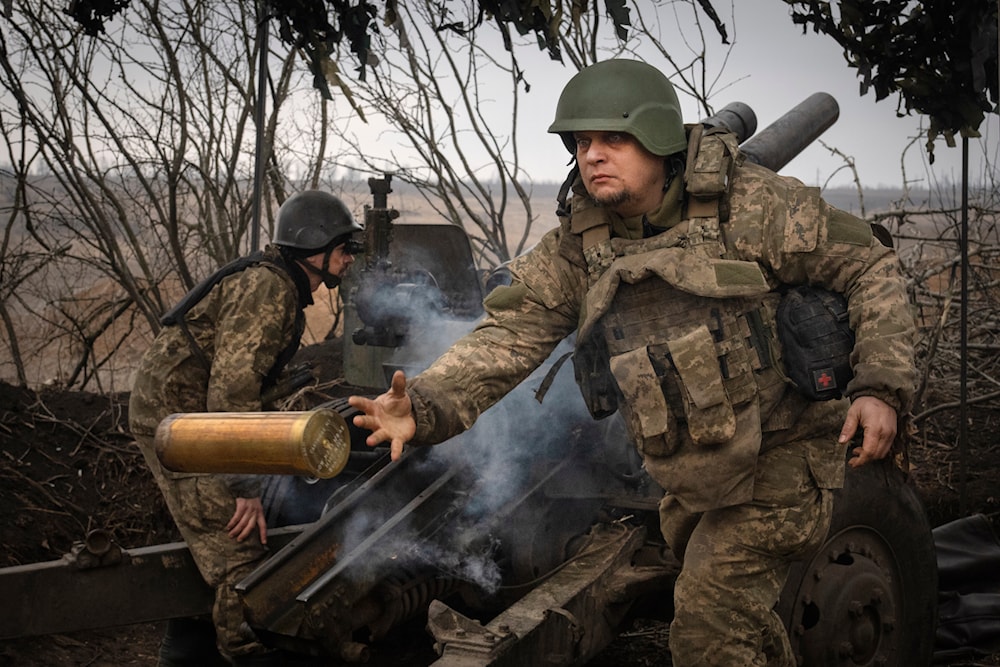Ukraine attacking Russia to lead to expanded buffer zone, US vet says
As Ukraine asks to be allowed to attack Russian soil, a US international consultant underlines that this would lead to worse repercussions for Ukraine.
-

Ukrainian soldiers fire an M101 howitzer at Russian positions on the front line, near the city of Avdiivka in Donetsk, Russia, March 22, 2024. (AP)
The United States granting Ukraine permission to attack Russian soil using Western weapons will not lead Kiev to avert a loss in the ongoing war; in fact, it would lead Moscow to establish a buffer zone large enough to prevent Ukraine from attacking its border areas, US Army Lieutenant Colonel and veteran consultant Earl Rasmussen told Sputnik on Saturday.
US President Joe Biden recently lifted restrictions on Ukraine's use of US-supplied weapons against targets in Russian territory, though officials claim that Biden made the move "only to defend the under-fire" Kharkov region against Russian forces.
Rasmussen asserted that this policy shift signals an impending intensification of hostilities, stressing that it would "not change the ultimate outcome of the conflict, which Russia is destined to win," adding: "What it will do is encourage Russia to expand the buffer zone that has been discussed and to potentially directly strike US and other NATO facilities supporting these actions."
The State Department clarified that the US has not authorized the use of long-range missiles, including ATACMS, inside Russia. However, Rasmussen suggested that Western intelligence and targeting information might have already been employed in earlier strikes by Ukraine.
ATACMS capable of striking deep in Russia
The US has supplied Ukrainian forces with short-range ballistic weapons that extend the precision targeting capabilities of Ukrainian forces to a radius of nearly 300 km at points of deployment.
The Army Tactical Missile System (ATACMS) comes in several variants that are subdivided into four categories. This includes a missile variant capable of carrying a warhead equipped with smaller bomblets capable of proximity detonation, which has been used to target Russian air defense batteries.
However, cluster versions of the bomblet-equipped warhead come in two versions, one that can hit targets 165 km away and another that can hit targets at a deeper 300 km range. Other variants include the M57 Block IA Unitary which has a range of 300 km and a warhead equipped with proximity, point, and delayed detonation capabilities. It has been circulated in Western news outlets that several M57 Block IA ATACMSs have been secretly delivered to Ukraine in recent months.
Rasmussen warned that this shift in policy could lead to a direct conflict between the US and Russia, which would yield catastrophic consequences. He criticized US policymakers for making increasingly hazardous decisions, driven by a deep political commitment to supporting Ukraine, despite the significant risks involved.
"Such decisions show that there are major influencers strongly seeking major escalation," Rasmussen cautioned. "Moreover, many of the political leaders are heavily politically committed for some reason to Project Ukraine and refuse to accept that it is a failure and would rather destroy their own countries and world than accept reality."
"History will not look favorably on the current group of Western leaders as they lead their countries into the abyss," he further warned.
Putin warns against long-range strikes on Russia
Biden's approval of strikes has led European NATO countries to suggest similar strikes on Russian territories. This led Russian President Vladimir Putin to caution certain NATO member states to understand the implications of their suggestions of allowing Kiev to initiate strikes on Russian territory.
"These representatives of NATO countries, especially in Europe, especially in small countries, they should be aware of what they are playing with. They should remember that this is usually a state with a small territory and a very dense population. This is a factor they should keep in mind before striking deep into Russian territory," Putin said during a press conference following his visit to Uzbekistan on May 28.
In his remarks, the Russian President emphasized that Moscow is closely observing such remarks. Putin further addressed NATO Secretary-General Jens Stoltenberg's comments regarding potential strikes, stating that Stoltenberg should recognize the indispensable role of space-based reconnaissance for deploying high-precision long-range weaponry.
Biden's support for Ukraine's expanded use of US-supplied weaponry marks a significant escalation, one that Moscow views as a dangerous provocation potentially destabilizing the entire region. These fears are further reinforced by bandwagoning European countries encouraging such strikes against one of the world's leading nuclear powers.
Escalating western positions
French President Emmanuel Macron, during a state visit to Germany, advocated for Ukraine's right to "neutralize" Russian military bases used to launch missile attacks against Ukraine.
Speaking at a press conference alongside German Chancellor Olaf Scholz on May 28, Macron emphasized that Ukraine should be able to target military sites but cautioned against striking other targets in Russia, especially civilian infrastructure.
"We think that we should allow them to neutralize military sites where missiles are fired, from where Ukraine is attacked," Macron stated. However, he added, "We should not allow them to touch other targets in Russia, and obviously civilian capacities."
NATO, in fact, joined in, also requesting that Kiev be permitted to strike inside Russia, with Stoltenberg stressing that Ukraine being denied "the possibility of using these weapons against legitimate military targets on Russian territory makes it very hard for them to defend themselves."

 5 Min Read
5 Min Read









